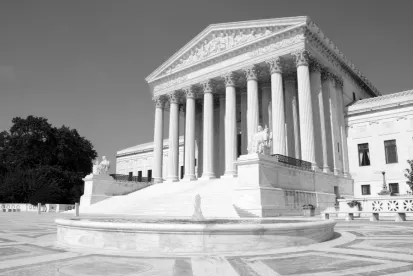On May 21, 2018, the United States Supreme Court upheld the legality of arbitration agreements containing class action waivers. In a 5-4 decision written by Justice Gorsuch, the Court held that arbitration agreements providing for individualized proceedings were valid, and neither the Federal Arbitration Act’s (“FAA”) savings clause, nor the National Labor Relations Act (“NLRA”) suggest otherwise.
The decision resolved an issue that had divided the Circuits, with the Court reversing the decisions of the 7th and 9th Circuits that had held that the NLRA rendered any sort of collective litigation waiver in an employment arbitration agreement unenforceable.
In its decision, the Court recognized the policy underlying the FAA and its requirement that courts enforce arbitration agreements according to their terms. Although the FAA contains a “savings clause” which invalidates arbitration agreements insofar as they conflict with other laws, the Court held that employees’ right to engage in “concerted activities” as guaranteed by the NLRA presents no such conflict. The Court noted that as a matter of statutory interpretation, statutes are to be read in harmony with one another, and conflicts arise only when they are explicit. A statute will not be displaced by another, absent a showing of a clearly expressed congressional intention to do so.
The Court declined to find such a conflict here. Although the NLRA protects “concerted activities,” the Court held that this protection is meant to encompass activities of a sort that “employees do for themselves in the course of exercising their right to free association in the workplace,” – it does not, as the employees argued, protect employees’ right to “the highly regulated, courtroom-bound ‘activities’ of class and joint litigation.” The Court also noted that while the NLRA provides a regulatory scheme for activities related to organization and collective bargaining, it is notably silent as to class or collective actions.
The Court bolstered its conclusion by relying on the Court’s treatment of other federal laws in relation to the FAA. In particular, the Court made reference to precedent holding that the Fair Labor Standards Act (“FLSA”), which specifically allows for collective suits for wages, does not invalidate arbitration agreements containing class action waivers. The Court reasoned that if the FLSA allows class action waivers for wage and hour disputes, certainly the NLRA, which regulates a completely different sphere, does not invalidate them. The Court went on to note that the Court has routinely declined to find a conflict between the FAA and other federal statutes, and it refused to find reason to reverse that line of reasoning with respect to the NLRA.
Finally, the majority rejected the argument that the National Labor Relations Board’s (“NLRB”) interpretation of the NLRA is entitled to Chevron deference. Although agency interpretations may be entitled to deference with regard to statutes it administers, such deference does not extend to their interpretations of other federal statutes it does not administer. The Court reasoned that allowing the NLRB to limit the FAA under the guise of interpreting the scope of the NLRA would essentially be “bootstrapping” the NLRB into an area which it has no jurisdiction.
The decision is a welcome development for employers hoping to avoid defending against burdensome and costly wage and hour class action suits. Employers should consult with legal counsel to ensure that their arbitration agreements contain valid and enforceable class action waivers.




 />i
/>i
